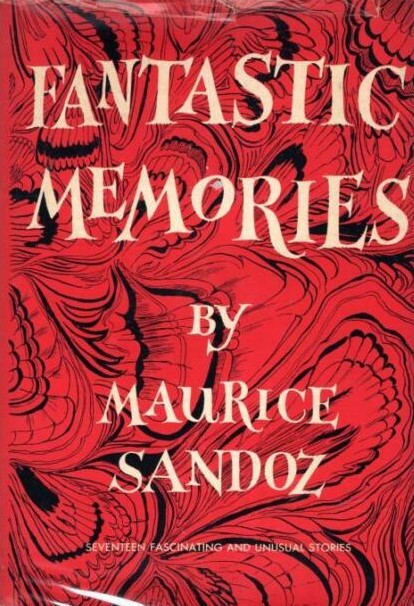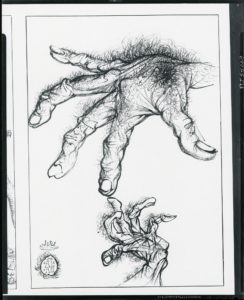 By MAURICE SANDOZ (Guilford Press/Doubleday; 1950/57)
By MAURICE SANDOZ (Guilford Press/Doubleday; 1950/57)
As the title promises, this short story collection purports to be a compilation of memories, most of them fantastic and/or macabre in nature. The author was Maurice Sandoz, the French fantasist responsible for the minor horror classic THE MAZE, a novel whose bent imagination is reflected in these tales.
The book’s overall concerns are neatly laid out in a brief preface, in which the author states that FANTASTIC MEMORIES “contents itself with the tale of strange happenings and makes no effort to explain them.” That’s not entirely true, as there are many explanations for the wonders contained herein; indeed, quite a few of the stories can be said to prefigure the TWILIGHT ZONE formula of presenting some bizarre happening followed by a climactic twist that sheds light on the hows and whys of that occurrence.
FANTASTIC MEMORIES “contents itself with the tale of strange happenings and makes no effort to explain them.”
Particularly representative tales include “The Limp-Paged Album,” about an album made of human flesh bearing a particularly nasty surprise involving one of the pictures therein; “The Lady of the Cornflowers,” in which the sight of an apparent ghost turns out to have a rational explanation that’s even more horrific than the supernatural one; “The Crutches of Uncle Celestin,” in which the narrator admits to doing macabre things with his uncle’s corpse that involve the deceased man’s crutches; and “Souvenir of Hammam Meskoutine,” in which an especially horrific dream turns out to have a disturbing relevance.
 The fact that this book was translated from the French may explain the thudding and oft-confusing descriptions, which clash with the otherwise stately prose (“The Hairy Hand,” involving a spider mistaken for a human hand, is especially confusing due to the fact that we never get a cogent description of said arachnid). Yet overall FANTASTIC MEMORIES must be counted as a success, with an impressive range of emotions and subject matter contained in admirably concentrated tales that, at an average length of 3-5 pages, never run too long.
The fact that this book was translated from the French may explain the thudding and oft-confusing descriptions, which clash with the otherwise stately prose (“The Hairy Hand,” involving a spider mistaken for a human hand, is especially confusing due to the fact that we never get a cogent description of said arachnid). Yet overall FANTASTIC MEMORIES must be counted as a success, with an impressive range of emotions and subject matter contained in admirably concentrated tales that, at an average length of 3-5 pages, never run too long.
The fact that this book was translated from the French may explain the thudding and oft-confusing descriptions, which clash with the otherwise stately prose…
One more thing: there exist two distinct English language versions of this book, one a gaudily designed large format hardcover from Doubleday and the other a more modest publication from the UK’s Guilford Press, whose contents are slightly different. The Doubleday version contains a penultimate story, “The Leaning Rock,” about a man’s deceased lover who leaves behind a most unique keepsake on the titular rock, that isn’t in the Guilford version, which replaces it with the more overtly fantastic “The Enchanted Island.” My pick is the Doubleday version, which is superior in design and content—although to get the full effect, obviously, you’ll need to peruse both publications.
